[et_pb_section bb_built=”1″][et_pb_row][et_pb_column type=”4_4″][et_pb_text _builder_version=”3.0.55″ background_layout=”light” text_orientation=”left” text_line_height=”1.4em” border_style=”solid”]
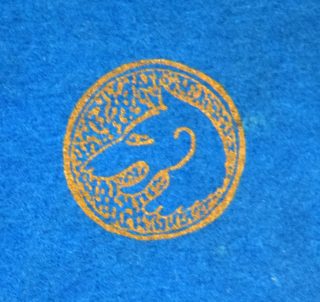
2017 marks the 100th anniversary of Hogarth Press, founded by Virginia and Leonard Woolf in their home in Richmond, England. Seeking an escape after years of financial stress, periodic mental instability, and the pressures of World War I, Leonard fulfilled a longtime wish of the couple, both well-established literary and intellectual figures already, when he purchased a used hand press so that could pursue their fascination with book arts.
All of the books shown here are available to students and researchers in the Special Collections of the University of Arkansas Libraries, along with our thousands of others rare books, Arkansiana, and large research archives.
An exhibit of Hogarth Press books is on display in Special Collections. (This article from the British Library gives more information about the significance of the Press. Suggestions for further reading are below.)
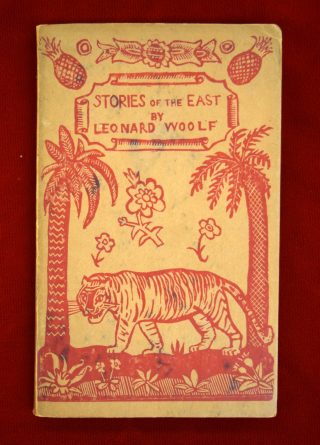
Between its inception and 1932, the Woolfs and their associates created 34 handmade books on topics ranging from poetry and fiction to essays on psychology and international relations. From the earliest publications, the Woolfs gave a platform to their fellow writers and friends, as well as emerging writers they sought to support. Family and friends such as Vanessa Bell, Virginia’s sister, helped with design, illustration, and construction. After its first books–Two Stories (1917) by Leonard and Virginia, Poems (1918) by C.N.S. Woolf, Prelude (1918) by Katherine Mansfield, and Poems (1919) by T. S Eliot–Hogarth attracted a series of young artists, bibliophiles, and future publishing professionals that filled out the staff and all contributed to the considerable labor of handprinting and growing what became a more conventional publishing house. Hogarth journeyed from the dining room from the house that gave it its name to the larder and eventually into the basement of the Woolf’s new home when they returned to London in 1924.
Special Collections holds examples of eight of the early handmade books from Hogarth Press, ranging from Leonard Woolf’s Stories from the East published in 1921 to George Rylands’s Poems published in 1931. At one point the earliest Hogarth in Special Collections would have been the extraordinarily significant early T.S. Eliot publication, Poems (1919), which came with the John Gould Fletcher book collection, but it has been missing since some time before 1973. (More about the Fletcher collection below.)
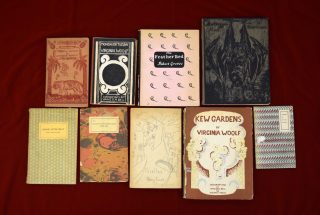
The often crudely constructed, but curiously beautiful early Hogarth Books survive as artifacts of a unique cultural moment, where writers and thinkers, some of whom came to be considered among the most influential of the 20th century, were brought together to produce art and literature through their connections to the Woolfs and their shared devotion to contributing to modernist culture during transformative times. From putting in print members of the influential Bloomsbury Group of intellectuals to introducing psychoanalysis (their acquaintance Sigmund Freud published in Hogarth) and translations of great Russian literature, the hobby pursuit of Leonard and Virginia left a lasting influence on the course of world culture.
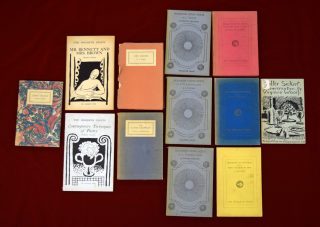
As the press became more successful and the Woolfs realized the limits of both their energy and expertise, they used other printers to complete larger projects. Sometimes these outside relationships produced good results, such as the significant books on Tolstoy printed by R & R Clark of Edinburgh in 1922, which retain the small press, artistic feel of the Woolf’s handprinted books, but in more substantial publications. (Two examples of these are in the University Libraries’ circulating collection.) Others, such as Monday or Tuesday (1921) by Virginia Woolf, printed by Prompt Press, were not satisfactory, at least to the author/publisher, although they were well-received by their circle of fellow writers and book lovers. With woodcuts by her sister Vanessa Bell, Monday or Tuesday combined several short stories Woolf produced after a major novel project. While its sales were respectable by new-press standards, it barely covered the expense of its manufacture. By the end of the 1920s and into the next decade, the Woolfs had several more successful books published as Hogarth Press, including Virginia’s Orlando (1928) and several works by her dear friend and sometime lover, Vita Sackville-West that established the press as a thriving, if exhausting business.
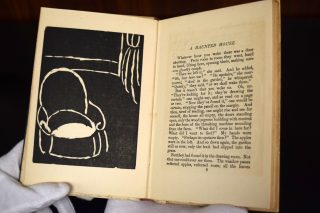
Virginia Woolf relinquished her stake in the press in 1937, and Hogarth became part of Chatto & Windus in 1946 after Leonard with drew his active participation. The Libraries hold numerous other first editions of the more than 500 books published by Hogarth press beyond the hand-printed ones, including large portions of series such as “Hogarth Letters” and “Hogarth Lectures.” Special Collections includes several first editions of Hogarth publications printed by other presses including Neil & Company of Edinburgh, and there are several examples from the important “Living Poets” series, including Matrix by Dorothy Wellesley, the first editor of the series.
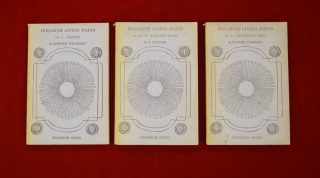
Most of volumes preserved in Special Collections came with the John Gould Fletcher Collection. A Pulitzer Prize-winning poet and native of Little Rock, Arkansas, Fletcher traveled extensively through Europe and amassed a large library of rare books and research materials. Held in the University Libraries since the 1950s, and in Special Collections since 1973, the Fletcher library includes numerous extremely scarce volumes such as first editions of T.S. Eliot, Ezra Pound, and D.H. Lawrence, as well as scores of limited-release volumes accumulated over his long career as a literary critic.
Two of the eight Hogarth handmade editions in Special Collections were not part of Fletcher’s library and were acquired by the University Libraries before the Special Collections was established 50 years ago this year in 1967. The copy of Virginia Woolf’s Kew Gardens is the 1927 second edition. (The small book was first published by Hogarth in 1919, and was similar to the edition of Poems by T.S. Eliot also released that year, with hand painted marbled paper binding.) That Kew Gardens, although very unusual, with a playful wood block-printed cover, was actually included in the University Libraries Main circulating collection until recently, and still includes a pasted-in slip for circulating cards. The 1931 Poems by Rylands, the second of 350 signed copies in that edition. was also once in the Libraries’ Main collection.
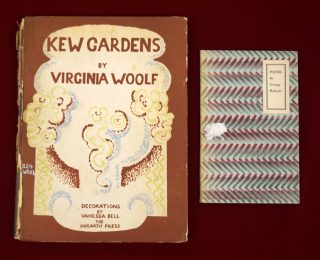
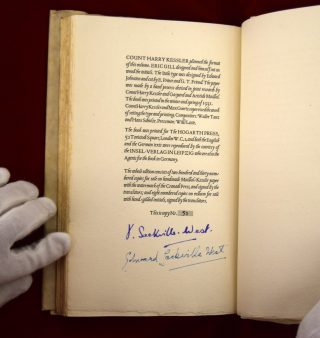
Special Collections holds another exceptional example from the Hogarth Press, although produced by a more accomplished printer. Elegies from the Castle of Duino (1931) by Rainer Maria Rilke, translated from the German by V. Sackville-West and Edward Sackville-West, was printed by Count Harry Kessler’s fine press endeavor, Cranach Press, with original woodcut letters and designs by renowned illustrator Eric Gill. The Fletcher Library copy in Special Collections is number 52 of 250 printed and signed by the Sackville-Wests.
For further reading about Hogarth Press and the Woolf’s handprinting adventures see:
Rhein, Donna E. The Handprinted Books of Leonard and Virginia Woolf at the Hogarth Press, 1917-1932. Ann Arbor, Mich: UMI Research Press, 1985. http://library.uark.edu/record=b1574593~S1.
Southworth, Helen, ed. Leonard and Virginia Woolf, the Hogarth Press and the Networks of Modernism. Edinburgh: Edinburgh University Press, 2010. http://library.uark.edu/record=b4011527~S1.
Willis, J. H. Leonard and Virginia Woolf As Publishers: The Hogarth Press, 1917-41. Charlottesville: University Press of Virginia, 1992. http://library.uark.edu/record=b1012485~S1.
Handprinted books from Hogarth Press in Special Collections (ascending by publication year)
Stories of the East (1921) by Leonard Woolf. (F1110 in the John Gould Fletcher Collection.) 55 pages with unique wood engraved cover design with tiger design.
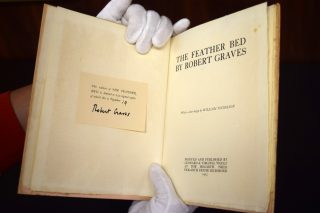
The Feather Bed (1923) by Robert Graves, with cover design by William Nicholson (Graves’ father-in-law). (F426 in the John Gould Fletcher Collection.) Number 19 of 250 signed copies of the first edition.
Mock Beggar Hall (1924) by Robert Graves, with cover design by William Nicholson (Graves’ father-in-law). (F429 in the John Gould Fletcher Collection.)
Grace After Meat (1924) by John Crowe Ransom, with an introduction by Robert Graves. (F854 in the John Gould Fletcher Collection.) Fletcher’s bookplate on inside cover.
Parallax (1925) by Nancy Cunard. Two cover illustration by Eugene McCown. (F247 in the John Gould Fletcher Collection.)
Chorus of the Newly Dead (1926) by Edwin Muir. (F739 in the John Gould Fletcher Collection.) Original handmade marbled paper binding, similar to earlier Hogarth publications.
Kew Gardens (1927) by Virginia Woolf. (PR6045.O72 K4.) Second edition by Hogarth Press; includes wood-engraved cover design and other illustrations by Vanessa Bell.
Poems (1931) by George Rylands. (PR6035.Y4 P6.) Number 2 of 350 signed copies of edition.
Other significant Hogarth books on exhibit:
Monday or Tuesday (1921) by Virginia Woolf, with woodcuts by her sister Vanessa Bell. (F1112 in the John Gould Fletcher Collection.) Includes Fletcher’s bookplate on inside cover.
Elegies from the castle of Duino (1931) by Rainer Maria Rilke, translated from the German by V. Sackville-West and Edward Sackville-West. Printed by Cranach Press, with original woodcut letters and designs by Eric Gill. (F892 in the Fletcher Collection.) Number 52 of 250 printed and signed by the translators. Original wrappers and slip-case.
[/et_pb_text][/et_pb_column][/et_pb_row][/et_pb_section]
